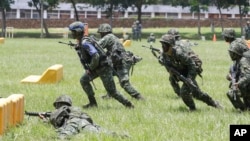Taiwanese Premier Cho Jung-tai has responded to remarks from former U.S. President Donald Trump that the island should pay more for defense, saying Taiwan is willing to shoulder more responsibility.
Speaking to reporters Wednesday, Cho said the island is dedicated to bolstering its own defenses.
"Taiwan has steadily strengthened its defense budget and adjusted the conscription serving period to strengthen resilience in our society to demonstrate our responsibility as one of the members of the international community," Cho said.
He added that Taiwan is "willing to take on more responsibility” when it comes to security of the Taiwan Strait and the Indo-Pacific.
In a Bloomberg Businessweek interview published Tuesday, when Trump was asked whether he would defend Taiwan from China, he said: “I know the people very well. Respect them greatly. They did take 100% of our chip business. I think Taiwan should pay us for defense.”
Trump went on to compare U.S. military spending on Taiwan to an insurance policy saying, “I don’t think we’re any different from an insurance policy. Why? Why are we doing this?”
Taiwan is home to the world’s largest chipmaker, the Taiwan Semiconductor Manufacturing Company. The chips that the company makes are used in a broad array of applications, from artificial intelligence to smartphones and fighter jets.
Analysts believe any conflict over Taiwan would decimate the world economy.
The United States is Taiwan's most important international supporter and arms supplier, but the two sides have no formal diplomatic relations. The U.S., however, is bound by the 1979 Taiwan Relations Act to provide Taiwan with the means to defend itself.
Taiwan has been a self-governing island since 1949. China views Taiwan as its own territory and has increased military pressure on the democratically run island to accept China's sovereignty claims.





